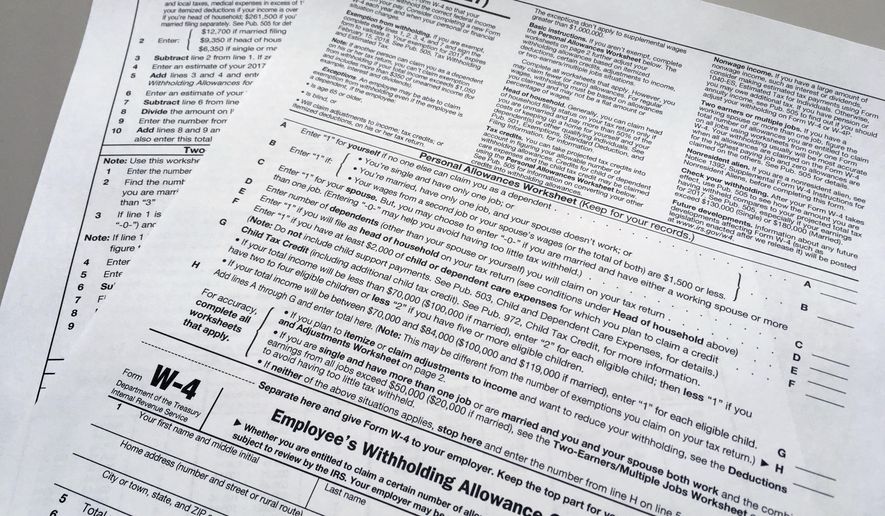The IRS is auditing fewer tax returns than at any other time in the past 15 years as the agency struggles with what it says is a shrinking budget and pressure from Congress to be less zealous in enforcement.
Just six out of every 1,000 individual taxpayers faced an audit last year, the government said in the latest IRS Data Book released last week, marking the lowest rate since 2002.
Analysts said that is unlikely to change this year, as the April 17 deadline for this year’s filing season nears and as the IRS grapples with endemic budget cuts and the strain of having to administer the new tax law.
Some taxpayer advocates cheered the news, saying it’s time the IRS was brought to heel after years of excesses, including targeting tea party groups for illegal scrutiny and making tax-filing season tougher than it had to be as a protest against budget cuts.
“It should be a healthy sign if they’re auditing less,” said Grover Norquist, president of Americans for Tax Reform. “I would very much like to live in a world where the IRS doesn’t have to do too much auditing because the tax code is simple enough for people to understand.”
But the agency’s defenders said having a working IRS is critical to collecting money owed to the government — particularly after Congress made the job even more complicated with the passage in December of the $1.5 trillion tax cut legislation.
“You’ve got this depleted workforce, they’re auditing fewer people, and now here comes this tax law that invites all kind of rampant tax sheltering, and they provide no additional money,” said Chuck Marr, director of federal tax policy at the left-leaning Center on Budget and Policy Priorities.
The IRS has been begging for more resources to conduct enforcement, but the Republican-led Congress has been reluctant to allocate the money.
Former IRS Commissioner John Koskinen has estimated that the agency leaves up to $8 billion per year in legitimately owed taxes on the table because of a lack of resources for enforcement.
The 2018 spending bill passed last month provides about $4.9 billion this year for enforcement within the IRS, which includes staff to conduct “examinations,” or audits. That is the same amount as in 2017 but well below the $5.5 billion level in 2011.
The staff dedicated to audits and collections has dropped from 44,000 in 2011 to 31,000 as of September.
Tony Reardon, president of the National Treasury Employees Union, said the IRS needs a boost if it is to carry out its job.
“This is an unsustainable situation for the agency that brings in 93 percent of the nation’s revenue, and it will worsen with additional cuts proposed in the administration’s 2019 budget,” he said.
The data show that for most taxpayers, the chance of facing an audit was less than one-half of 1 percent last year. The chances increased to 15 out of 1,000 for those with incomes above $500,000 and 145 out of 1,000 people with incomes over $10 million.
In the past, the IRS has connected the declining audit rates to budget cuts at the agency.
Mr. Norquist also said the IRS breached Americans’ trust by spending money to target tea party groups for intrusive scrutiny when it could have been using that money elsewhere.
“I know sometimes they argue, ‘Well, we don’t have enough money to do this.’ They have had money to do things that they shouldn’t have done,” Mr. Norquist said.
Congressional Republicans are proposing an overhaul of the IRS, but that’s not likely to include an infusion of cash.
Instead, lawmakers on the House Ways and Means Committee, the chief oversight panel for the IRS, have proposed long-term changes to the IRS that could free up resources to be used elsewhere by upgrading the agency’s aging technology.
“We believe that fixing the underlying problems — one of them being the outdated technology slowing the agency down — is a far better use of taxpayer dollars and will help the agency gain efficiency and effectiveness in all functions,” said Ways and Means Committee spokeswoman Julia Slingsby.
Among other items, the draft proposal from Reps. Lynn Jenkins, Kansas Republican, and John Lewis, Georgia Democrat, directs the agency to develop an information technology strategy and expand the use of electronic filings.
In the short term, the agency is in the thick of tax filing season, which started Jan. 29, and is experiencing a surge in web traffic compared with last year.
Through March 23, more than 307 million visits have been made to the agency’s website — an increase of nearly 25 percent from the same time last year.
About 85.7 million individual returns were received and 83.2 million returns processed — both up slightly from last year.
Even amid strained resources, the agency has worked to improve its customer service in recent years, particularly during tax filing season.
The IRS did improve its call response rate in recent years, eclipsing 70 percent in 2017 and 2016 after falling below 40 percent in 2015.
But the agency’s taxpayer advocate reported this year that the IRS anticipated being able to answer only about 6 in 10 calls during the current filing season.
The advocate also warned last month that it was receiving “very high call volumes” on its toll-free phone line because issues with the IRS’s income verification process have delayed tax refunds for a substantial number of taxpayers.
Through March 23, the agency had issued 67.6 million refunds — a 1.1 percent decrease from the same time last year — totaling nearly $197.7 billion.
• Stephen Dinan can be reached at sdinan@washingtontimes.com.
• David Sherfinski can be reached at dsherfinski@washingtontimes.com.




Please read our comment policy before commenting.